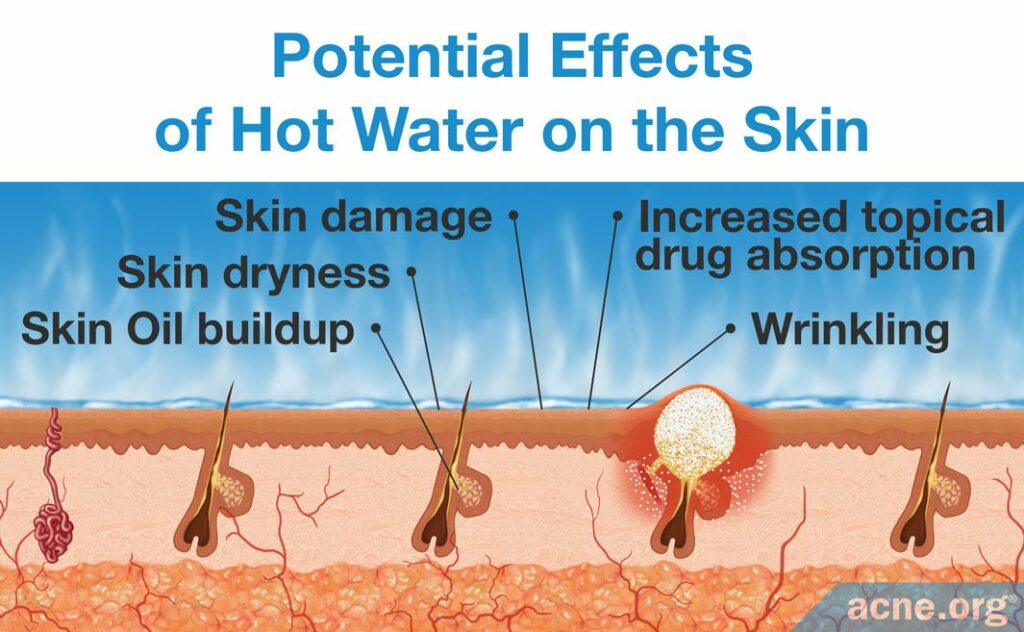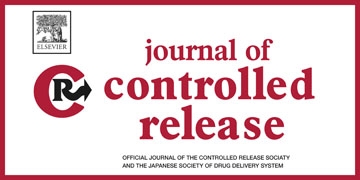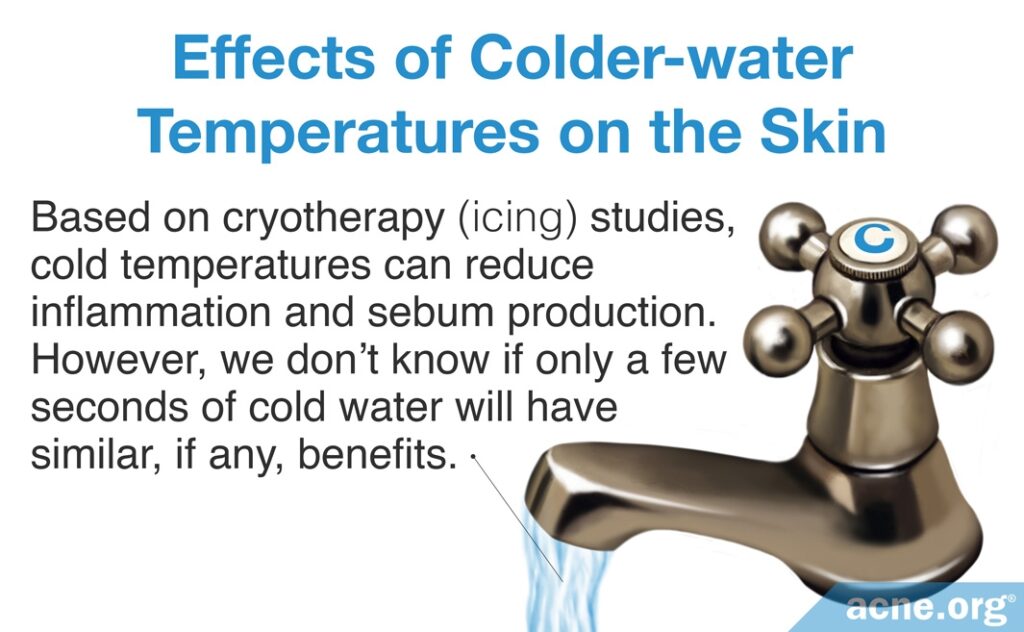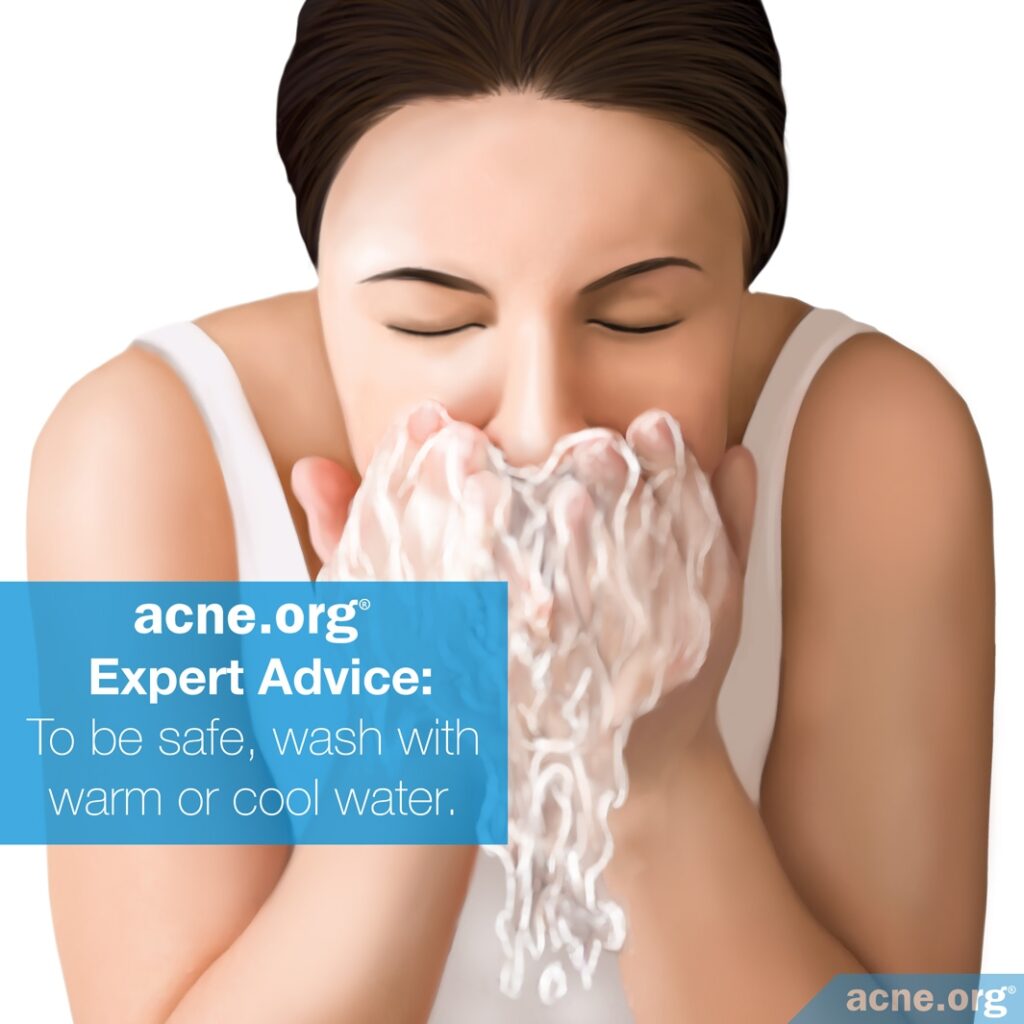Views: 0
Warm, Cool, or Cold Water Is Fine, but Avoid Hot Water

The Essential Info
Warm Water May Be Ideal: Some evidence shows that warm water may improve skin healing.
Cool or Cold Water Is Fine: There is no evidence that washing with cool or cold water would be detrimental in any way.
Avoid Hot Water: Washing the skin in very hot water (over 42° celsius / 107.6° fahrenheit) has been shown in some studies to cause skin dryness, skin oil excretion, and skin aging.
The Bottom Line: Acne-prone skin is clearest when it is in balance, which means it is not overly dry or irritated. To be on the safe side, use warm water when you can. If you prefer it, cool or cold water should be perfectly fine as well.
Wash the Right Way: Whether you are using warm, cool, or cold water, it is vital that you avoid irritating your skin when you wash by:
- Staying Gentle: Use a featherlight touch and wash for 10 seconds or less. This might seem like a very short time, and it is, but it’s important because it reduces irritation. Physical irritation can lead to more acne.
- Using Only Bare Hands: Avoid washcloths and spinning brushes. They are far more irritating than your bare hands.
- Using a Gentle Facial Cleanser: Use a liquid cleanser made specifically for the face and avoid soap. Soap will strip the skin and may lead to more acne.

The Science
Washing with warm, cool, or cold water is safe. But it is probably best to avoid very hot water because a few isolated studies suggest exposing the skin to heat above 42°C (107.6° F) has effects such as:1-3
- Drying the skin: Acne-prone skin should be kept in balance and not made overly dry.
- Increasing skin oil (sebum) excretion: Generally speaking, more skin oil = more acne.
- Damaging the skin barrier (outer layer of the skin): People with acne tend to have an impaired skin barrier, and anything that damages the skin barrier may promote a breakout.
- Causing changes to the skin that are similar to those that happen when the skin ages: This doesn’t have to do with acne, but nobody wants prematurely aged skin.
However, keep in mind, these effects are due to hot water, not warm water. One study showed that warmer temperatures (but not hot) might actually improve skin healing. In other words, while it is probably best to avoid hot water, warm water is likely to be ideal.
When it comes to cold water, we have no studies that look at how washing with cold water affects acne. However, we do know that ice is dramatically anti-inflammatory and may help heal acne. Would cold water do the same? Probably not to the same degree, but it probably also wouldn’t hurt.
The Bottom Line: Washing with warm water that does not scald or burn the skin is a good and safe idea. If you prefer to wash with cool or cold water, or do a cold rinse after washing with warm water, feel free.
Now let’s delve deeper into the science.
Hotter Temperatures

Some isolated studies find that the skin may absorb topical treatments more readily when it is warmed up. However the majority of studies point toward drawbacks of exposing the skin to hot temperatures, including skin dryness, skin oil buildup, skin damage, and wrinkling. Taken together, these studies seem to suggest that washing the skin with hot water might have more harmful than beneficial consequences. Open the drawer below if you’d like to read through the various studies.
Expand to read details of research
Absorption of topical drugs
Research indicates that hot temperatures may increase absorption of topical drugs into the skin, for reasons that are not well-understood.4 In other words, washing the skin with warm or hot water might potentially help topical acne treatments to penetrate.

In a 2015 review published in the Journal of Controlled Release, scientists reported enhanced absorption of topical drugs when skin was warmed to 30 °C (86°F) and higher.4 The reason is not understood. The scientists hypothesized that changes in the skin barrier and increased blood flow to the skin were responsible. The skin’s lipids (fats) are an important part of its barrier. When the skin’s outer layer becomes hydrated, the lipids in the skin become liquid-like. Warmer temperatures further increase lipid fluidity. When there is more blood flowing to the skin, it becomes warmer. Higher temperatures cause the blood vessels in the skin to dilate, or widen in diameter, which allows more blood to flow to the skin. Lower temperatures cause the blood vessels to constrict, or shrink in diameter, inhibiting blood flow to the skin.5
On the other hand, several isolated studies show that hot temperatures may cause negative consequences, such as skin dryness, skin oil buildup, and perhaps skin barrier damage and wrinkling.1-3 Let’s take a look at each.
Skin dryness
One thing we know for certain is that hot water can strip the skin of oils that are essential for protecting and hydrating the skin. If these oils are not replaced, the skin becomes dry and itchy, as described in one scientific article.1

In an article in Nutrition Reviews, the authors wrote, “Skin dryness is usually associated with exposure to dry air, prolonged contact with hot water and scrubbing with soap (both strip oils from the skin).”1

A study published in the Journal of Clinical Medicine in 2022 found that keeping the hands in hot water for 10 minutes caused skin dryness in healthy volunteers. The researchers noted that keeping the hands in cold water for the same amount of time also caused some skin dryness, but significantly less compared to hot water.2 In the real world, this means washing the skin for 10 minutes may dry the skin, especially if you use hot water.
Skin oil (sebum) buildup
A scientific report published in 1976 noted that hot water can temporarily narrow skin pores and may also cause skin oil to drain out of pores more quickly.3 It is unlikely that these temporary effects could contribute to acne. However, the fact remains that washing the skin with hot or warm water can damage the skin barrier, making the skin more prone to acne.

In 1976, a review in the British Journal of Dermatology reported that hot water caused swelling of the skin cells lining the pore, which narrowed the diameter of the pore, making it difficult for sebum to escape onto the surface of the skin. This resulted in pores being clogged. Because acne is caused by an initial clogged pore, this is something which could hypothetically be a concern. However, the temporary narrowing of a pore caused by heat is reversible and is likely not a concern when it comes to clogged pores. The same report stated that sebum excretion increased 10-fold for every 1°C (1 degree Celsius) rise in air temperature. That is, warmer temperatures caused existing sebum to drain out of the pores more easily than cooler temperatures.3 This shouldn’t be of concern either since draining/excretion of sebum isn’t necessarily a factor in acne development. Rather, sebum production is. In spite of all of this, the important thing to note when it comes to washing with warm/hot water is that water of this temperature can damage the skin barrier, which makes the skin more susceptible to acne.
Skin barrier damage
A healthy skin barrier defends the skin against foreign particles and bacteria and helps prevent water loss. When it comes to acne, there is evidence that people with acne have a compromised skin barrier.6
Four studies have found that prolonged exposure to temperatures at or above 40°C can damage the skin barrier.2,7-9 Such exposure might occur when taking a long shower or bath in hot water.

A 2022 study published in the Journal of Clinical Medicine found that submerging the hands in hot water at 44°C (111.2°F) for 10 minutes damaged the skin barrier in healthy volunteers. Submerging the hands in cold water at 4°C (39.2°F) for the same amount of time also caused some skin barrier damage, but not as much as with hot water. The researchers wrote, “[L]ong and continuous water exposure damages skin barrier function, with hot water being even more harmful.”2

A 2009 study published in the Journal of Investigative Dermatology Symposium Proceedings found that exposure to 43°C (109.4°F) heat for 90 minutes caused changes to the skin that were similar to those caused by too much sun exposure, such as premature wrinkling and skin-cell damage. Their results revealed that prolonged exposure to 43°C heat can cause oxidative stress, which means that the levels of certain molecules in the skin can cause damage to cell structures and DNA (genes). They also found that prolonged exposure to heat released molecules that can negatively affect the strength and structure of the skin.7 To keep acne at bay, it is best to maintain a healthy and balanced skin barrier.

A 2007 study published in the Journal of Investigative Dermatology found that applying heat between 36°C and 40°C (96.8°F and 104°F) actually helped the skin barrier recover from damage faster. However, temperatures above 40°C delayed skin barrier recovery. The authors hypothesized that these effects were due to the presence of molecules called neurotransmitters in the skin.6 Neurotransmitters help the body and brain communicate with one another, and they can influence the skin’s response to stresses, such as extremes in temperature.

A 1997 study published in the journal Acta Dermato-Venereologica tested the effect of water temperature on skin that is washed with a cleanser. A group of 10 participants immersed their forearms in a solution containing a potentially irritating cleanser ingredient called sodium lauryl sulfate (SLS) twice a day for 10 minutes. Each participant placed his/her right forearm in this solution at 20°C while placing the left forearm in an identical solution at 40°C. This experiment was repeated for two days. The researchers found that immersing the skin in cleanser solution at 40°C for 10 minutes twice a day weakened the skin barrier. Immersing the skin in cleanser solution at 20°C, on the other hand, did not weaken the skin barrier. While there was no difference in skin irritation between the two forearms, the researchers noted that the weakened skin barrier would make the skin more susceptible to irritation from chemicals like those found in harsh cleansers.8 In addition, a weakened skin barrier might also make the skin more vulnerable to infections.9
Wrinkling
You may have noticed that your fingers wrinkle up like raisins when exposed to water for a long period of time. This effect is temporary and reversible.
One study found that such wrinkling occurs more quickly in warmer water.10 This could be a potential concern since it is possible that repeated temporary wrinkling could eventually lead to permanent skin wrinkling. However, since temporary wrinkling due to water occurs mainly on the fingers and toes, this is probably not an issue when it comes to washing your face with warm water.

According to a 1997 study published in The Journal of Hand Surgery, warmer water caused this temporary wrinkling to accelerate. Participants in this study submerged their hands into buckets of water at temperatures ranging from 20°C to 45°C (68°F to 113°F). The shortest time it took for hands to wrinkle was 3.8 minutes in 45°C water, and the longest it took was 8.7 minutes in 20°C water. As far as we know, these effects are completely reversible. However, it is possible, yet not probable, that repeated wrinkling might accelerate permanent wrinkling of the skin over time.10 Since facial skin does not wrinkle like skin on hands after prolonged exposure to water, this is probably not something to worry about.
Colder Temperatures

Only one study has tested the effect of cold water on the skin. In that study, researchers asked volunteers to immerse their hands in water at 4°C (39.2°F) for 10 minutes. This is similar to taking a long bath in nearly ice-cold water. The researchers found that continuous exposure to cold water caused skin dryness and damaged the skin barrier, although not as much as the same amount of time spent in hot water.2 It’s difficult to say exactly what this result means for people looking to quickly rinse their faces with cold water, but at least it confirms that washing the skin for too long is not advisable.
While there are no other studies examining the effects of cold or cool water when applied to the skin, cold temperatures can reduce swelling and inflammation,11,12 including the swelling and inflammation characteristic of acne.13
Most of our knowledge about how cold affects the body comes from cryotherapy, the well-known practice of applying cold to an injury site like a sprained ankle. However, cryotherapy is effective only once the skin temperature is reduced all the way down to 10°C to 15°C (50°F to 59°F),12 which can take application of cold temperatures for 10 – 20 minutes on major joints of the body. When it comes to the skin, application of cold temperatures reduces the skin temperature more quickly, in as little as 5 minutes. Still, that is far more time than anyone takes washing their skin. Furthermore, cold water from the faucet is much warmer than the cold that is used in cryotherapy, like ice for example.
Still, when it comes to acne, applying anything cold to the skin probably can’t hurt. For instance, one study found that even a single session of cryotherapy might help reduce skin oil (sebum) production, which could help acne sufferers since most people who have acne have an increased level of skin oil production.14
Expand to read details of study

A 2015 study published in the Journal of Investigative Dermatology showed that cryotherapy also reduced the number of sebocytes (skin oil cells) and total sebum production. A single treatment of -10°C (14°F) for 20 minutes reduced sebum production by 20% for 2 weeks.14
However, again, washing with cool or cold water for only a few seconds is highly unlikely to have the same effect.
So, when it comes to cool temperatures, we know that icing an acne lesion can help heal it more quickly, but whether washing with cool water for only a few seconds would approximate anything close to the application of ice or not is doubtful.
Conclusion

Washing in hot water may cause damage to the skin over time and could disrupt the important skin barrier. Warm water, on the other hand, is fine. If you like washing with warm water, feel free to continue. If you prefer cool or cold water, that’s fine too.
References
- Popkin, B. M., D’Anci, K. E. & Rosenberg, I. H. Water, hydration, and health. Nutr. Rev. 68, 439 – 458 (2010). https://www.ncbi.nlm.nih.gov/pubmed/20646222
- Herrero-Fernandez, M., Montero-Vilchez, T., Diaz-Calvillo, P., Romera-Vilchez, M., Buendia-Eisman, A. & Arias-Santiago, S. Impact of water exposure and temperature changes on skin barrier function. J Clin Med. 11, 298 (2022). https://pubmed.ncbi.nlm.nih.gov/35053992/
- Cunliffe, W. J. et al. Pilo-sebaceous duct physiology. Br. J. Dermatol. 95, 153 – 156 (1976). https://www.ncbi.nlm.nih.gov/pubmed/133708
- Shahzad, Y., Louw, R., Gerber, M. & du Plessis, J. Breaching the skin barrier through temperature modulations. J. Control. Release. 202, 1 – 13 (2015). https://www.ncbi.nlm.nih.gov/pubmed/25616160
- Kellogg, D. L. In vivo mechanisms of cutaneous vasodilation and vasoconstriction in humans during thermoregulatory challenges. J. Appl. Physiol. 100, 1709-1718 (2006). https://www.ncbi.nlm.nih.gov/pubmed/16614368
- Denda, M., Sokabe, T., Fukumi-Tominaga, T. & Tominaga, M. Effects of Skin Surface Temperature on Epidermal Permeability Barrier Homeostasis. J. Invest. Dermatol. 127, 654 – 659 (2007). https://www.ncbi.nlm.nih.gov/pubmed/17068482
- Cho, S. et al. Effects of Infrared Radiation and Heat on Human Skin Aging in vivo. J. Investig. Dermatology. Symp. Proc. 14, 15 – 19 (2009). https://www.ncbi.nlm.nih.gov/pubmed/19675547
- Ohlenschlaeger, J., Friberg, J., Ramsing, D. & Agner, T. Temperature dependency of skin susceptibility to water and detergents. Acta Derm. Venereol. 76, 274-276 (1996). https://www.ncbi.nlm.nih.gov/pubmed/8869682
- Carrico, A. R., Spoden, M., Wallston, K. A. & Vandenbergh, M. P. The environmental cost of misinformation: Why the recommendation to use elevated temperatures for handwashing is problematic. Int. J. Consum. Stud. 37, 433-441 (2013). https://www.ncbi.nlm.nih.gov/pubmed/23814480
- Cales, L. & Weber, R. A. Effect of water temperature on skin wrinkling. J. Hand. Surg. Am. 22, 747 – 749 (1997). https://www.ncbi.nlm.nih.gov/pubmed/9260639
- Schaser, K. D. et al. Prolonged superficial local cryotherapy attenuates microcirculatory impairment, regional inflammation, and muscle necrosis after closed soft tissue injury in rats. Am. J. Sports. Med. 35, 93 – 102 (2007). https://www.ncbi.nlm.nih.gov/pubmed/17197574
- Greenstein, G. Therapeutic efficacy of cold therapy after intraoral surgical procedures: a literature review. J. Periodontol. 78, 790 – 800 (2007). https://www.ncbi.nlm.nih.gov/pubmed/17470011
- Thai, K. E. & Sinclair, R. D. Cryosurgery of benign skin lesions. Australas. J. Dermatol. 40, 175 – 184; quiz 185 – 176 (1999). https://www.ncbi.nlm.nih.gov/pubmed/10570551
- Jalian, H. R. et al. Selective Cryolysis of Sebaceous Glands. J. Invest. Dermatol. 135, 2173 – 2180 (2015). https://www.ncbi.nlm.nih.gov/pubmed/25860384
The post Should You Wash Your Skin with Hot or Cold Water? appeared first on Acne.org.

